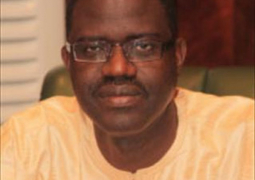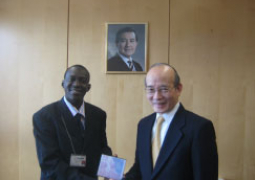The celebration in Kerr Demba Holleh village was under the theme: ‘We Pledge for Parity: Our Girls are Not for Sale, Stop Trafficking’.
The day was meant to celebrate the achievements of women and devise strategies to address some of the challenges that women are facing in society.
Muhammed Lamin Saidykhan, national coordinator of Activista-The Gambia, said efforts should be made to empower women including ensuring that women inherit land as they inherit other resources within families.
He said women need to be empowered by ensuring that they are given all their rights including right to land.
“Research has shown that only 1 per cent of land in Africa is owned by women,” Mr Saidykhan said.“In The Gambia, if you are able to do a thorough research, you will find out that very few percentage of our land is owned by our women and research has also shown that about 80 per cent of food that are consumed in our households is produced by women. So when women do not have land, how would they feed our families?”
He noted that the problem of land grabbing is high in Africa as lot of multi-national companies come to the continent grabbing the land and denying people enough space for farmland space for crop production to feed families.
Stop trafficking
Activista-The Gambia national coordinator said many of young girls and women are been trafficked to the Arab world and Europe where they are “used as slave and sex workers”.
“It is now high time for Gambian to really realised this menace and take critical actions to end this dangerous act that is really affecting us as Gambians,” Mr Saidykhan said.
Lamin Jarju, deputy director of ADWAC, said child trafficking has become an issue in Africa in addition to the much talked about AIDS, climate change, food insecurity, and poverty.
“This is very threatening and it is really a big concern,” he said, adding that there is a need to amplify sensitisation from the grassroots level to policy level and seek for political commitment.
“Political commitment is very relevant in this fight, the issue is rising and there is a need for the state and non-state actors to ring the ball because our children are being traffic to Asia and other countries not for economic reasons but they are used as tools to develop does countries,” Mr Jarju said.
Fatou Manneh of the Network of Gender Action Group, Upper Niumi, said the network is out to empower women of the district in ending all forms of gender-based violence.
She said through sensitisation, the organisation was able to reduce violence against women marital homes, on the streets and at schools.
However, she said, despite our interventions, women are still facing numerous difficulties in their martial homes.
“They are denied land which they have all right to own,” Ms Manneh said.
Aja Lumbatou Samateh, a resident of Albreda whose family land was said to be grabbed from them, claimed that all their ancestral lands from the side of her father were unlawfully grabbed by the village Alkalo.
“We lodged a complaint to the authorities of the region but still nothing is done about it because we are women, they see us as people who have no right to own a land,” she lamented.
Kumba Sanyang of Upper Niumi Women Assembly said her assembly’s role is to fight for women ownership of land within the district.
She noted that women of the district find it very difficult to have their rightful share of their ancestral land.
“All that we are saying is ‘take your two and give us our one’,” she said, referring to the Islamic law on inheritance.
Ms Sanyang revealed that in Upper Niumi, only 3 per cent of women own land and out of this, only 2 per cent is legally registered.
“This means women ownership of land is still lacking in this district, so it will be difficult for us to achieve food self-sufficiency,” she said.



